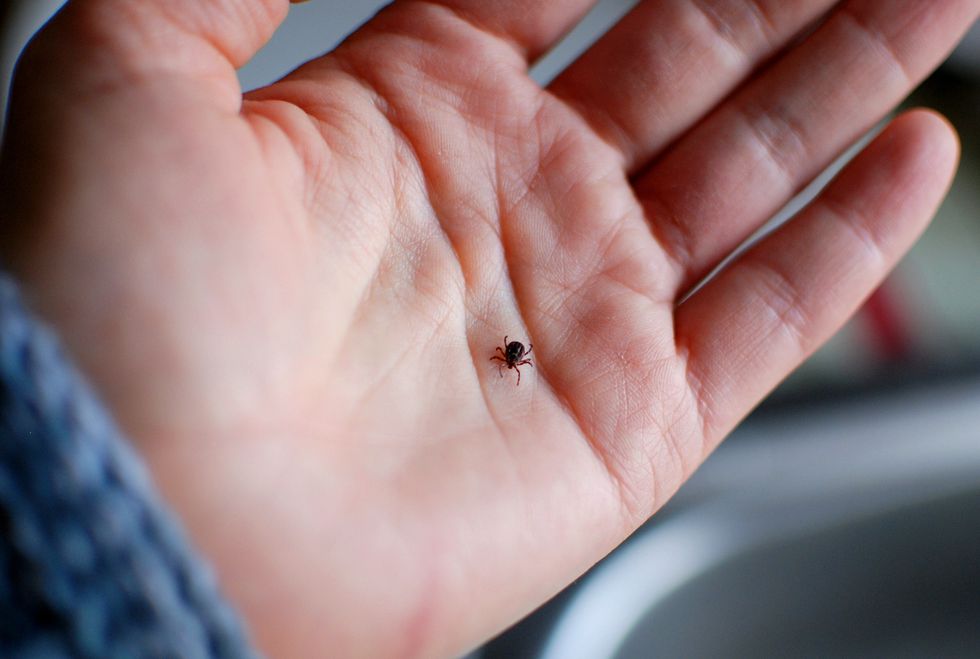

Health officials say tick populations will explode this summer, putting you at a greater risk of Lyme disease.
- Ticks are most prevalent from April through October, and experts warn that bug populations are rising this year.
- Contrary to popular belief, people in urban areas can also get tick bites.
- Here are the steps you need to take to prevent tick bites.
Warm weather is finally here, ushering in picnics, trips to the beach, and a giant “tick explosion,” according to health experts.
Thomas Mather, M.D., the director of the University of Rhode Island’s tick-borne disease center, warns that this summer will see higher than average tick populations throughout the country. “They’re up and looking for a host hoping something will walk by that they can latch on,” he told Boston’s WXFT.
Entomologist Marten Edwards shows the proper technique in removing ticks to help you lower the risk of contracting Lyme disease.
Though tick populations are active from April through October, they tend to rise in the summer, and numbers this year are expected to be higher than previous seasons, thanks to bizarre weather patterns that provide ideal environments for them. This means you’re at greater risk of coming into contact with a tick this year, which in turn puts you at greater risk of getting Lyme disease.
And while we typically think that ticks tend to be concentrated in rural, woody areas, Kayla Socarras, a microbiology researcher at Drexel University College of Medicine in Philadelphia, Pensylvania, says ticks can be a problem in every region of the United States.
But it’s not hard to protect yourself from them. Here are four ways you can do so.
1) Wear the Right Clothes
After months of enduring heavy coats and bulky sweaters, the last thing you want is to hide under more layers of clothes. But Socarras says long-sleeved shirts and pants are the best way to ward off bites.
She also recommends trading gray and black for summer white, as bugs tend to blend in with darker items.
“Wear light-colored clothing,” she says. “You’re much more able to spot the ticks on your legs.” So stuff your pants into your socks for ultimate protection.
2) Invest in Sprays
When it’s just too hot for long sleeves and you yearn to feel the sun on your skin, you should turn to insect repellents, advises Michael Zimring M.D. of the Mercy Medical Center in Baltimore, Maryland.
Look for formulas containing DEET, picaridin, or oil of lemon eucalyptus to deter ticks, according to the Centers for Disease Control and Prevention.
If you’re really overzealous, you can even spray your clothes with products containing permethrin, which will stay on garments even after a few cycles through the washer.
“The permethrin is good for four to six weeks, maybe more,” Zimring says.
3) Perform Tick Checks
Even if you follow every tick-fighting tip in the book, Socarras recommends thoroughly checking your skin for black spots after a trip outside.
“Ticks are so small, people sometimes confuse them for a freckle,” she warns.
You should also hop in the shower to wash off and inspect every part of your body. “They like moist areas, like the groin and under your arms,” Socarras says.
4) Don’t Assume Ticks Only Lurk in the Woods
Ticks are more than just a nuisance for hikers and outdoorsy types. They can also be found in city parks and backyard apple trees. If you have one in your backyard, pick up any fruit and clear out dead leaves, which can also harbor ticks, Zimring suggests.
City dwellers also aren’t in the clear. Ticks can easily latch on to birds, mice, and other animals while you’re enjoying that Sunday picnic in the grass.
“In general, you can be bitten by a tick in the most urban of places. It’s a common misconception that you can’t get bitten in the city,” Socarras says. “I would recommend that everyone takes precaution.”



